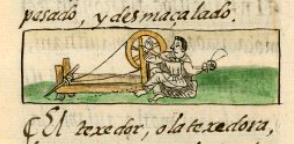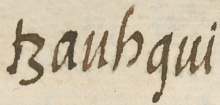tzauhqui (FCbk10f23v)
This iconographic example, featuring a spinner (tzauhqui), is included in this digital collection for the purpose of making comparisons with related hieroglyphs. The term selected for this example comes from the text near the image in the Digital Florentine Codex. There is no gloss, per se. This example shows a fully clothed man, sitting on a small woven seat (icpalli), engaged in the act of spinning (iquitiliztli, or ihquitiliztli, with the glottal stop). The spinning wheel is larger than he is. He has one hand on the wheel and one hand holding the carded wool or cotton. His clothing consists of a white shirt and trousers in a European style, plus a Nahua cloak tied with the knot over his chest. The clothing folds involve lines and shading, which give it a three-dimensionality (a European artistic influence). A spindle located at the far end of the spinning wheel structure shows some accumulated yarn.
Stephanie Wood
The occupation of spinner was primarily a woman’s job prior to Spanish colonization, and surely women were the majority of spinners for years to come, even while men entered the more technical spinning jobs on the newly-introduced spinning wheels, such as this record shows. Glyphs relating to spinning primarily involve spindles of a pre-contact type, of the type used by women. There is one example from the Matrícula de Huexotzinco that shows tzauhqui (spinner) as a man’s occupation, while showing the traditional spindle (malacatl) used by women. However, another male tzauhqui occupation listed in that same manuscript involves a wheel, suggesting he is a spinner who was using the new technology–possibly true, too, of his counterpart even though he was marked by the old-fashioned spindle.
Stephanie Wood
tzauhgui
tzauhqui
Stephanie Wood
1577
Jeff Haskett-Wood
hilo, textiles, tecnología, madera
tzauhqui, one who spins thread or yarn, https://nahuatl.wired-humanities.org/content/tzauhqui
el hilador
Stephanie Wood
Available at Digital Florentine Codex/Códice Florentino Digital, edited by Kim N. Richter and Alicia Maria Houtrouw, "Book 10: The People", fol. 23v, Getty Research Institute, 2023. https://florentinecodex.getty.edu/en/book/10/folio/23v/images/0 Accessed 5 September 2025
Images of the digitized Florentine Codex are made available under the following Creative Commons license: CC BY-NC-ND (Attribution-NonCommercial-NoDerivs 4.0 International). For print-publication quality photos, please contact the Biblioteca Medicea Laurenziana ([email protected]). The Library of Congress has also published this manuscript, using the images of the World Digital Library copy. “The Library of Congress is unaware of any copyright or other restrictions in the World Digital Library Collection. Absent any such restrictions, these materials are free to use and reuse.”






